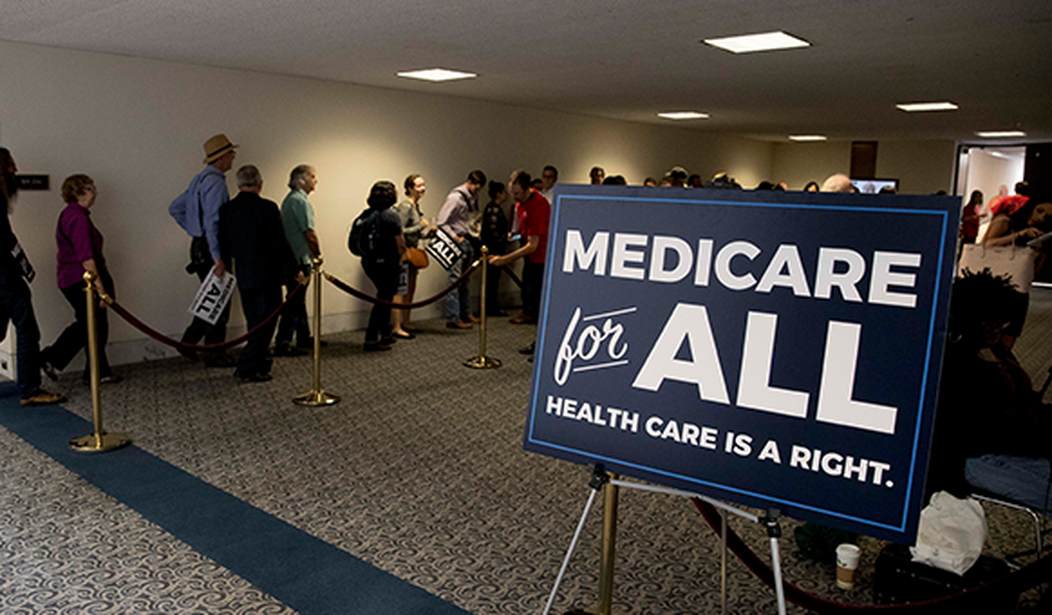Could Medicare for All have averted more than 330,000 deaths over the course of the COVID-19 pandemic? That's the claim of a new study published by 10 researchers from four different universities in Proceedings of the National Academy of Sciences.
To arrive at their figures, the authors compared the mortality risks of COVID and other causes of death among the insured and uninsured. Since the uninsured receive less medical care and are more likely to have preexisting conditions like diabetes, the researchers concluded that fewer lives would have been lost if there had been universal health care throughout the pandemic.
It may seem intuitive that having health insurance should result in better health. But that premise is faulty. Studies based on real-world data indicate that the link between insurance and good health is weak.
Consider the Oregon Health Insurance Experiment. In 2008, the state expanded Medicaid by lottery, creating the conditions for a natural experiment to determine what kind of impact insurance coverage had on a person's health.
Researchers compared health outcomes for people who received Medicaid and similarly situated individuals who remained uninsured. They found that "Medicaid coverage generated no significant improvements in measured physical health outcomes in the first 2 years."
Similarly, when researchers examined the impact of Obamacare for the National Bureau of Economic Research in 2017, they discovered that there were sizeable improvements in access to care not just in the states that expanded Medicaid under the terms of the law but also in those that did not. In the end, they saw "[n]o statistically significant effects on risky behaviors or self-assessed health" despite the expansion of coverage.
Recommended
What explains these results?
Though the government can give people health coverage, it has not found a way to guarantee them access to high-quality medical care. Nine in ten healthcare providers take private insurance, but only 85% accept Medicare and 71% take Medicaid, according to a recent report from the Medicaid and Children’s Health Insurance Program Payment and Access Commission.
In other words, just because a person has health insurance doesn't mean a doctor will see them.
Moving to a single-payer, Medicare-for-all type system might seem to address this problem. After all, if everyone had the same insurance, then doctors couldn't discriminate as they do now.
But single-payer systems are notorious for paying providers less than they could command in an open market. Doctors tend to respond to this underpayment by limiting the supply of care they're willing to provide at the government-dictated price.
Others quit the practice of medicine entirely and pursue different careers. Over time, promising students avoid medical school, preferring fields that are not controlled by the government. The result is a shortage of physicians, especially specialists.
A 2020 report from the Congressional Budget Office concluded that single-payer leads to "congestion" and "delays and foregone care."
That's exactly what happens in single-payer systems in Canada and the United Kingdom.
The median wait time to receive treatment from a specialist in Canada following referral by a general practitioner is roughly six months. The median wait for an MRI up north is more than 10 weeks.
According to SecondStreet.org, a Canadian think tank, Canadians made more than 217,000 trips abroad to seek medical care in 2017.
As of May, more than 6.6 million people in England were waiting for treatment from the National Health Service. In June, more than 22,000 people waited more than 12 hours to be admitted to the hospital after an emergency department decided to admit them. Less than two-thirds of cancer patients receive their first treatment within two months of an urgent referral from their doctor.
These long delays have a dire impact. Last month, British residents were shocked by the story of a 19-year-old girl who died of cancer after waiting over a year to see her doctor.
Government guarantees of insurance coverage amount to little more than tickets to a waiting list and rationed care. All too often, those waits or outright denials are deadly.
Sally C. Pipes is president, CEO, and the Thomas W. Smith fellow in healthcare policy at the Pacific Research Institute. Her latest book is "False Premise, False Promise: The Disastrous Reality of Medicare for All" (Encounter Books 2020). Follow her on Twitter @sallypipes.

























Join the conversation as a VIP Member